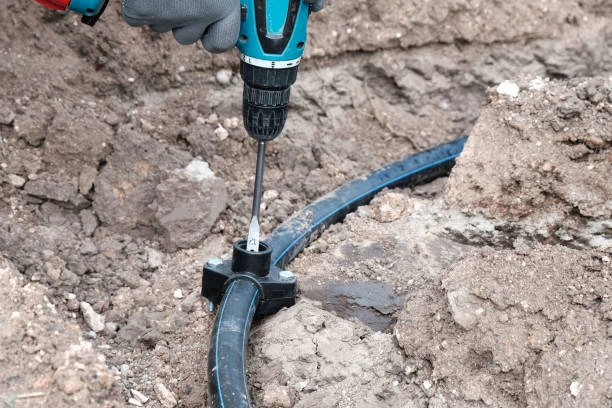Introduction
Rocla, a leading manufacturer of infrastructure solutions, has recently completed a significant project by supplying 19 kilometers of High-Density Polyethylene HDPE pipe for the Polokwane Waste Water Treatment Plant in South Africa. This initiative is crucial for enhancing the city’s wastewater management capabilities and promoting sustainable practices in water treatment. In this article, we will explore the importance of HDPE pipes, the details of this project, and the broader implications for wastewater management in urban areas.

Understanding HDPE pipe
High-Density Polyethylene HDPE are widely recognized for their strength, flexibility, and durability. These pipes are used extensively in various applications, including:
- Water distribution
- Sewage and wastewater management
- Irrigation systems
- Industrial applications
The advantages of HDPE pipes include resistance to corrosion, low maintenance requirements, and a long lifespan, often exceeding 50 years. Their lightweight nature facilitates easier transportation and installation compared to traditional materials like concrete or steel.
The Polokwane Waste Water Treatment Plant Project
Project Overview
The Polokwane Waste Water Treatment Plant project aims to improve the management of wastewater in the city, ensuring that treated water meets environmental standards before being released into the ecosystem. The installation of 19 kilometers of HDPE pipes is a critical component of this project, enabling efficient transportation and treatment of wastewater.
Objectives of the Project
The primary objectives of the project include:
- Enhancing Treatment Capacity: The new HDPE pipes will help increase the plant’s capacity to treat wastewater, accommodating growth in the city and improving public health.
- Reducing Environmental Impact: By ensuring that wastewater is treated effectively, the project aims to minimize pollution and protect local water bodies.
- Promoting Sustainability: The use of HDPE pipes aligns with sustainable practices, as these materials are recyclable and have a lower carbon footprint during production compared to traditional alternatives.
Benefits of Using HDPE Pipe
The decision to use HDPE pipes in the Polokwane project brings several advantages:
1. Durability and Longevity
HDPE pipes are resistant to various environmental factors, including corrosion, chemicals, and UV radiation. This durability translates to a longer lifespan and reduced need for repairs or replacements.
2. Cost-Effectiveness
While the initial investment in HDPE pipes may be higher than traditional materials, their long-term benefits—including lower maintenance and installation costs—make them a cost-effective solution.
3. Flexibility and Ease of Installation
The lightweight nature of HDPE pipes allows for easier handling and installation, reducing labor costs and installation time. Their flexibility enables them to be used in various terrains and conditions.
4. Leak Resistance
HDPE pipes provide a secure, leak-proof system for transporting wastewater, significantly reducing the risk of contamination and environmental damage.
5. Environmental Benefits
HDPE pipes are manufactured using sustainable practices and are fully recyclable. Their use contributes to reducing the overall environmental impact of wastewater treatment processes.
Project Implementation
Timeline and Phases
The implementation of the 19 kilometers of HDPE pipes involved several phases, including:
- Planning and Design: Detailed planning was essential to ensure that the pipe layout met the operational needs of the wastewater treatment plant.
- Manufacturing: Rocla’s state-of-the-art manufacturing facilities produced high-quality HDPE pipes that met the required specifications.
- Transportation: The lightweight pipes were transporte efficiently to the project site, minimizing logistical challenges.
- Installation: Skilled labor teams installed the pipes, ensuring proper alignment and connection to existing infrastructure.
- Testing and Commissioning: Once installed, the system underwent rigorous testing to ensure functionality and compliance with regulatory standards.
Challenges and Solutions
Throughout the project, several challenges were encountere, including:
- Site Conditions: The terrain in some areas posed challenges for installation. Rocla’s team utilized innovative techniques to overcome these issues, ensuring a successful installation.
- Regulatory Compliance: Meeting local environmental regulations was paramount. The project team worked closely with regulatory authorities to ensure all standards were met.
The Importance of HDPE pipe Wastewater Treatment
Effective wastewater treatment is critical for public health and environmental protection. In urban areas, untreated or inadequately treated wastewater can lead to serious health risks and environmental degradation. By investing in advanced infrastructure like the Polokwane Waste Water Treatment Plant, cities can:
- Improve Public Health: Proper treatment reduces the risk of waterborne diseases, ensuring safe water for the community.
- Protect Ecosystems: Treating wastewater before it is release into water bodies helps preserve local ecosystems and biodiversity.
- Support Sustainable Development: Efficient wastewater management is essential for sustainable urban growth, allowing cities to accommodate population increases without compromising environmental health.
Conclusion
The supply of 19 kilometers of HDPE pipes for the Polokwane Waste Water Treatment Plant represents a significant advancement in the city’s wastewater management efforts. By leveraging the benefits of HDPE technology, Rocla is contributing to improved public health, environmental protection, and sustainable urban development. As cities worldwide face increasing pressure to manage water resources effectively, projects like this highlight the importance of investing in modern infrastructure solutions.
HDPE pipe FAQs
1. What are HDPE pipes use for?
HDPE pipes are commonly use for water distribution, sewage and wastewater management, irrigation systems, and various industrial applications.
2. Why are HDPE pipe preferre for wastewater treatment?
HDPE pipes offer durability, resistance to corrosion, flexibility, and leak-proof systems, making them ideal for efficient wastewater transport.
3. How long do HDPE pipe last?
HDPE pipes typically have a lifespan exceeding 50 years, making them a long-term solution for various applications.
4. Are HDPE pipe recyclable?
Yes, HDPE pipes are fully recyclable, which contributes to sustainable waste management practices.
5. What challenges are face in installing HDPE pipe?
Challenges may include site conditions, regulatory compliance, and ensuring proper alignment and connection to existing infrastructure. Solutions often involve innovative installation techniques and close collaboration with regulatory authorities.


















